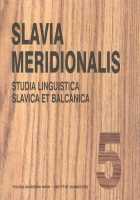Historia jako fatum. Dzieje narodu i państwa według współczesnych historiozofów serbskich
History as the fate. The past of the nation and of the state according to the contemporary serbian historiographers
Author(s): Dorota GilSubject(s): History
Published by: Instytut Slawistyki Polskiej Akademii Nauk
Summary/Abstract: Similarly like in the other post-Yugoslavian countries, the critical reflection over the history of the state and the nation in Serbia, for many reasons (Orthodox Church authority, folklore, romantic literature and the communistic ideology) was pushed aside and substituted by a model of ‘defensive’ history based on the division between „strange” and „our”. The contemporary philosophical reflection over the history of Serbia and Serbs entered this scheme to a certain degree. The presented work takes into account perspective which is close to the post-Hegel idea of history of the state and nation, which assumes an existence of historical determinism and Christian historiography defining history as the history of redemption. Analysis of R. Samardžić works (first of all Ideje za srpsku istoriju and Kosovsko opredeljenje) and V. Jerotić works (Srbija i Srbi. Između izazova i odgovora) leads to the conclusion that both scientists, very often described as the Christian historiosophers (especially Jerotić), propose the original reflecion over their national history, in which history appears (first of all for Samardžić) as either the part of world deprived of metaphisical prospective, or history of redemption inscribed in a context of the God’s economy. Fatality, „ill fortune”, destination – particularly in Samardžić opinion – results in ‘historical curse’ which deprives Serbs of the eschatological perspective. Both thinkers share not only the same understanding of history but also the idea of tradition mainly based on Serbian Orthodox Church and an interpretation of philosophy of suffering which leads to the liberation and seeing the tragic nature of the national past and the state which is the result of Serbia’s disadvantageous geographical situation. They are both interested in the etnopsychology which becomes one of the most important components of their historiosophical reflection. Since for Samardžić the central problem has become understanding of the history as the ‘quintessence of soul’ and giving diagnosis which is the proposition of two basic ‘ideas for the Serbian history’, Jerotić sees the possibility of diagnosis in answering the question ‘How have Serbs responded to the challenges of history?’ (according to Toynbee’s ‘challenge and the answer’ of nations in the world history).
Journal: Slavia Meridionalis
- Issue Year: 2005
- Issue No: 05
- Page Range: 11-30
- Page Count: 20
- Language: Polish

